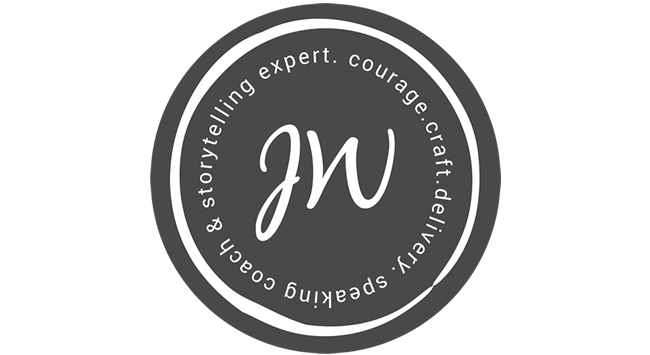What Do You Do When You Go Blank On Stage?
June 25th, 2019

A few weeks ago I wrote about different ways to use a pause when speaking. One of the best pauses to get friendly with is the “I’ve gone totally blank and can’t remember what the heck I was gonna say next” pause. In Tuesday’s Speaker’s Playground, we got talking about that exact moment…
It goes something like this: You’re mid-presentation. You thought you were ready. You practiced–granted not as much as you wish you had, but still, you practiced. Then all of a sudden you are surrounded by blank.
The tape inside your head might sound like: “Ooooooh sh**. I can’t remember what the heck I was gonna say next, I’m totally blank, all words are gone from my head, as in totally gonzo, and here I am standing in the deep abyss of nothingness…
The next thing I was gonna say is the most brilliant thing ever but it is nowhere to be found in the deep crevices of my mind and body and a whole bunch of people staring at me waiting for the next word and I AM TOTALLY BLANK.”
Yeah. That.
Do you know that moment? I do.
I’m pulling back the curtain and sharing some stories of BLANK moments for me, and times I’ve witnessed other speakers go BLANK, with suggestions for a few different ways for you to deal with BLANK when BLANK happens.
1. Breathe, pause and wait
One of the most terrifying blanks I’ve ever experienced was a few years ago when I was giving a very personal talk to an audience of about 300 people. I was not as prepared as I would want you or me or anyone to be when giving a talk that is no small deal. But alas, there I was, unprepared and totally blank.
I got to a point in the very scripted and timed talk where I had NO IDEA what words came next.
NO FREAKIN IDEA.
Here’s what I did: First, I felt the immense terror of HOLY COW I HAVE NO IDEA WHAT’S NEXT.
The operative word here is felt.
I felt it instead of running from it or ignoring it or stuffing it away. Yes, it was terrifying. And I felt the sensation of the terror roll through my body.
Then I waited, breathed, connected to my feet on the ground. I connected with the audience by noticing they were there in the room with me. I didn’t panic or apologize or stammer and stumble or freak out about whether or not I was going to remember.
I waited for the words to come and stayed with the sensation in my body–the sensation, not the story. I held that moment as long as I could. It felt like an immense eternity. In actuality, yes it was a long pause, but to the audience, it just felt like a long, on purpose, dramatic pause.
Then I knew I had to say some words. I repeated the last line I’d said (see tip 2 below) and inhaled to continue. Even when I inhaled, I had no idea which words would come out. But there they were, right at the top of the inhale, the next words. I let out a big internal exhale of relief and carried on. (Here’s a link to the spot in the talk where this happened.)
2. Repeat the last line you just said
This is like backing up and getting a running start.
Sometimes when I’m speaking, my brain gets ahead of itself and loses track of what’s next. When I back up for a do-over, and repeat the line I just said, the thought catches up.
When you repeat the line, repeat it with the intention of emphasis. It’s as if you’re saying “I’m repeating these words because I really want you to hear them.” (Not because I can’t remember what to say next.) You gotta sell it.
Here’s the moment in that same talk when I did this.
The thing is, even when I said the line twice, the words didn’t come. I managed to stall, and take my running start. But even in repeating that line, the words I wanted to say didn’t come. I said something else, which totally worked, but it wasn’t what I’d planned. Which brings me to the next point.
3. Let go and move on. Then get over it.
No matter how prepared you are, there’s a good chance you’ll forget something. You’ll leave out a brilliant line. You’ll go blank and say something you didn’t intend to say. THAT’S OK. Plan NOW for leaving out those beautifully crafted words. It will happen.
There’s a good chance you won’t forget them the next time you give the talk. If you do, they probably weren’t meant for that talk anyway. All that to say is don’t get too attached to your perfectly crafted talk. It has a life of its own and will change as you give it–with or without intention.
So let go, move on, get over it, and keep speaking.
4. Come clean.
In the middle of a memorable talk I heard at Emerging Women Conference a few years ago, the speaker went blank on stage. First she paused, and hung out in the pause for a couple of breaths, which was fine. I had no idea she was lost.
Then she came clean. She said “I have no idea what’s next.” The whole audience cheered.
It was a vulnerable, terrifying moment that she completely let us in on.
Her assistant in the audience gave her the next line, and she carried on.
After this moment of complete transparency, she was more connected, more present, more relaxed. The audience was with her. All pretense was gone. She delivered the rest of the talk with ease and breath.
It seems important to note that’s the talk from the entire conference that has stayed with me longest.
5. Stumble through and cross your fingers.
Indeed, this is not choice number 1. But I did it here. And I didn’t die. AND NOTHING BAD HAPPENED.
Sure it might have been “better” to pause, and slow down, and wait for the words. But we don’t always make the perfect choice in the moment!
We do our best, and then we move on.
If you do stumble a little, don’t beat yourself up. A fews ums, ahs and stumbles are not going to make or break your talk. Let it go. You’re human. We like your humanity. We want humans speaking to us, not robots. The more you let us see your humanity, the more likely we are to resonate with whatever it is you’re saying.
6. Practice.
It’s true that you’re more likely to go blank when you’re not prepared. Trust me, I know from experience.
So take the time and prepare. Get that talk into your bones. Give yourself time to make it yours. With practice, there’s more space to speak it from your heart and feel the pauses. Then you won’t be thrown by something unexpected that might come your way, and own that talk inside and out. (Here are some tips for practicing your talk.)
However you find your way through the blank, do your best to…
STAY PRESENT. STAY IN THE ROOM. KEEP BREATHING. TRUST YOURSELF.
We, the audience, are on your side. The audience wants you to succeed. They want the wealth of your expertise. They want to hear your story.
So take a breath, and tell us.
What do you think? Can’t wait to have a moment of blank so you can try out these ideas? That’s the spirit! In the comments below tell me how you survived your last moment of blank. Or send a word when you survive your next one. I’d love to hear!
Here’s to fun in the blank!
If you enjoyed reading this post, be sure to connect with me on LinkedIn for more updates and tips.
One response to “What Do You Do When You Go Blank On Stage?”
Leave a Reply
« How to OWN THE ROOM from any Stage | Epic Content: Here are the secrets »


 FACEBOOK
FACEBOOK INSTAGRAM
INSTAGRAM LINKEDIN
LINKEDIN SUBSCRIBE
SUBSCRIBE
Dear Joanna,
There are no words to express how much I appreciate you and the wisdom and inspiration that burst like fireworks from your teachings.
Thank you for showing up in the world and for opening the space for others to show up! I’m stepping into the circle and it feels fantastic!